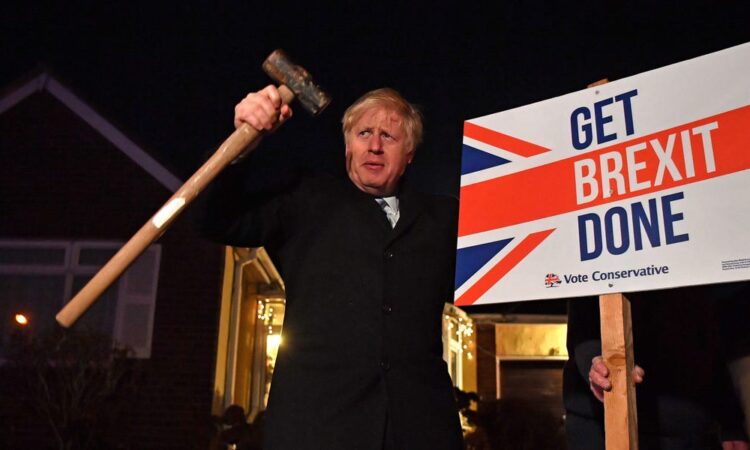
- The pound hit an all-time low last week as the new UK government’s tax-cut plans spooked markets.
- The strong US dollar is a big factor — but Brexit’s hit to the UK economy set the stage for the rout.
- Brexit rattled faith in the UK as a safe bet, and the abrupt tax cuts have shaken confidence further.
The British pound‘s crash last week is seen as a story of US dollar strength — but dig deeper, and the long-lasting impact of Brexit emerges.
As markets fretted about the new British government’s tax-cutting pledges, strategists pointed to the UK’s withdrawal from the European Union as a root cause of the fall.
Brexit was fueling the UK currency’s longer-term decline long before it plummeted to a record low on Monday, analysts said. It has hit the country’s labor market and trade, and has contributed to rising inflation — weighing heavily on the UK’s economic health.
“Brexit was always going to be a negative for the economy and the pound in the years immediately after leaving,” Oanda market analyst Craig Erlam told Insider.
“It’s impossible to quantify the role of Brexit in the pound’s devaluation over the last six years. But it’s clear that until now, it’s done the UK economy no favors,” he added.
Dollar strength vs pound pain
The strength of a country’s currency is often seen as an indicator of its overall economic health.
Sterling sank to an all-time low of $1.0350 Monday, as investors got spooked by new UK chief finance minister Kwasi Kwarteng’s promises to cut taxes at a time when the UK is battling 9.9% inflation.
One big factor is the strength of the US dollar, which has gained against most currencies this year. The Federal Reserve’s historically big interest rate hikes have made the greenback more attractive to international investors, pushing up its value.
But the pound has fallen steadily against the dollar for the past six years, sliding over 23% from $1.44 on the eve of the June 2016 Brexit referendum. It dropped to $1.33 in just two weeks after the vote.
Since the vote, the turbulent premierships of Theresa May and Boris Johnson — as well as the coronavirus pandemic — helped drive economic uncertainty.
Now that uncertainty has intensified, as the spending plan promoted by Prime Minister Liz Truss and Kwarteng — both committed backers of Brexit — draw criticism from the International Monetary Fund and ratings agency Moody’s.
Lawmakers in their own party have also spoken against the proposals, which are seen as likely to drive up inflation and work at cross-purposes with the Bank of England’s monetary tightening. The BoE itself stepped in to start buying long-dated government bonds to stabilize markets and the situation.
Brexit undermined international confidence in the British economy, opening the door to the pound’s plummet and financial market rout this week. Investors lost even more faith in the UK as a safe bet thanks to worries the tax cuts would spread disarray.
SEB analyst Ole Hvalbye said the UK is deeply indebted and suffers from chronic budget problems, and it struggled during the 2008 financial crisis. “Since then, UK politicians have worked hard to make the situation worse,” he wrote in a note.
The Brexit impact
One way Brexit has hurt the UK economy is the significant fall in immigration from the EU since Britons voted to leave in 2016. That’s created major labor shortages, particularly in healthcare, hospitality, and science.
“The British labor market was a flagship in Europe: flexible, low unemployment, and with productive labor immigration,” Hvalbye said. “Brexit — which is a political and not an economic position — changed the conditions.”
“We are already seeing the consequence with lower labor force participation and relatively fast-rising wages, despite lousy growth,” he added, referring to economic growth.
Rising wages tend to fuel inflation, which weakens the pound because its purchasing power falls.
Meanwhile, the UK has struggled to renegotiate key trade deals with the EU. As the country is heavily reliant on imports from the trading bloc, food and gas prices have risen — contributing to a bleak inflation picture.
There’s also been a significant decline in investment, with economic uncertainty leading businesses to curb their spending, according to August data from the Institute of Directors.
The Resolution Foundation think-tank warned last year the UK should brace for a decade-long period of economic decline due its departure from the EU, among other factors.




